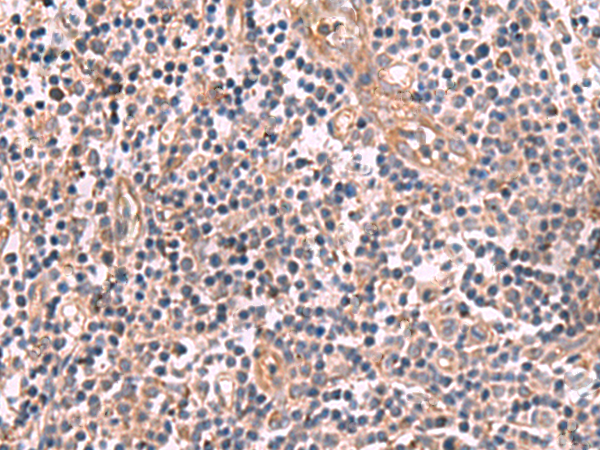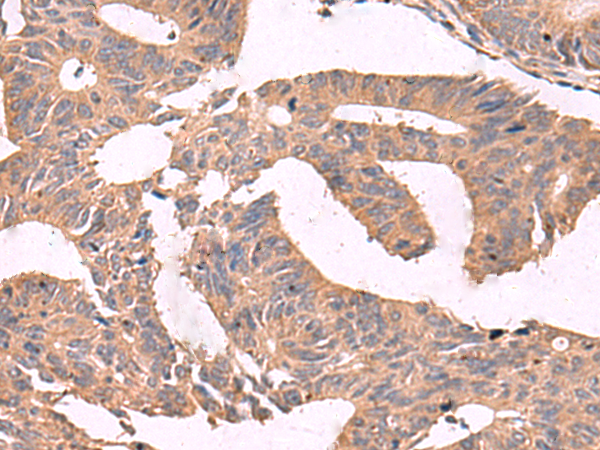

| WB | 咨询技术 | Human,Mouse,Rat |
| IF | 咨询技术 | Human,Mouse,Rat |
| IHC | 1/70-1/350 | Human,Mouse,Rat |
| ICC | 技术咨询 | Human,Mouse,Rat |
| FCM | 咨询技术 | Human,Mouse,Rat |
| Elisa | 1/5000-1/10000 | Human,Mouse,Rat |
| Aliases | NTI; GIG36; MGLAP |
| Host/Isotype | Rabbit IgG |
| Antibody Type | Primary antibody |
| Storage | Store at 4°C short term. Aliquot and store at -20°C long term. Avoid freeze/thaw cycles. |
| Species Reactivity | Human, Mouse, Rat |
| Immunogen | Fusion protein of human MGP |
| Formulation | Purified antibody in PBS with 0.05% sodium azide and 50% glycerol. |
+ +
以下是关于MGP(Matrix Gla Protein)抗体的3篇参考文献及其摘要概括:
---
1. **文献名称**:*"Characterization of monoclonal antibodies for matrix Gla protein (MGP) and their application in immunohistochemistry"*
**作者**:Schurgers LJ, et al.
**摘要**:该研究开发了针对不同形式MGP(羧化与非羧化)的单克隆抗体,验证了其在组织切片中的特异性应用。结果表明,这些抗体能有效区分MGP的活性状态,并揭示了动脉粥样硬化斑块中羧化M蛋白的缺失与钙化相关。
2. **文献名称**:*"The role of matrix Gla protein in vascular calcification: Critical effects of phosphorylation and antibody recognition"*
**作者**:Cranenburg EC, et al.
**摘要**:文章探讨了MGP磷酸化修饰对抗体结合能力的影响,发现磷酸化会干扰部分抗体的识别。研究通过免疫印迹和ELISA技术,提出需谨慎选择抗体以准确评估MGP在血管钙化中的功能。
3. **文献名称**:*"Development of a novel ELISA for uncarboxylated matrix Gla protein (ucMGP) and its application in chronic kidney disease patients"*
**作者**:Proudfoot D, et al.
**摘要**:该研究建立了一种新型ELISA检测方法,利用特异性抗体检测血清中的非羧化MGP(ucMGP)。在慢性肾病患者中,ucMGP水平升高与血管钙化程度显著相关,提示其作为生物标志物的潜力。
---
以上文献聚焦于MGP抗体的开发、特异性分析及在疾病研究中的应用,为MGP的功能与检测提供了关键工具和理论依据。
Matrix Gla Protein (MGP), a vitamin K-dependent protein, plays a critical role in inhibiting vascular calcification and soft tissue mineralization. First identified in the 1980s, MGP is synthesized in vascular smooth muscle cells, chondrocytes, and other tissues. Its function hinges on post-translational γ-carboxylation, a process requiring vitamin K, which enables MGP to bind calcium ions and prevent pathological mineralization. Deficiencies in MGP or its carboxylation are linked to cardiovascular diseases, chronic kidney disease, and rare genetic disorders like Keutel syndrome.
MGP antibodies, developed to detect and quantify this protein, are essential tools in studying its physiological and pathological roles. These antibodies target specific epitopes, including carboxylated (cMGP) or undercarboxylated (ucMGP) forms, enabling researchers to investigate MGP's involvement in vascular health, bone metabolism, and disease mechanisms. Commercial and custom MGP antibodies are widely used in immunoassays (ELISA, Western blot), immunohistochemistry, and flow cytometry. Recent studies also explore their diagnostic potential, as altered MGP levels correlate with cardiovascular risk and renal dysfunction. However, challenges persist in standardizing assays due to MGP's structural complexity and variability in post-translational modifications. Ongoing research aims to refine antibody specificity and develop therapeutic strategies targeting MGP pathways to combat calcification-related diseases.
×